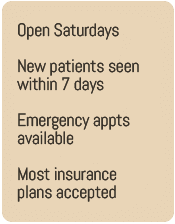COLON CANCER TREATMENT
Thanks to advancements in colon cancer treatment and research, the five-year survival rate for colon cancer has increased from 48.6% in 1975 to more than 65% today, according to the National Cancer Institute. Our practice is at the forefront of genetic testing and personalized targeted cancer treatments to help further advance the survival rate of colon cancer. At Personalized Hematology-Oncology, we combine our scientific expertise with compassionate care to provide a custom-tailored approach to treating patients with colorectal cancer.
About Colon Cancer
Colorectal cancer, or colon cancer, is the uncontrolled growth and spread of mutated cells at the lower end of the digestive tract in the colon or rectum. Typically, colon cancer starts with small, non-cancerous cells called polyps that eventually develop into cancer over time. These polyps often do not produce any symptoms at all, so regular colonoscopy screenings are important for detection and removal.
Colon Cancer Risk & Prevention
Colon cancer affects men and women at similar rates; the lifetime risk of developing colorectal cancer for men is 4.3% and 4.0% for women. The majority of those diagnosed with colon cancer are 50 years of age or older, which is why regular screenings later in life are so important.
A patient’s lifestyle and medical history play a large role in his or her risk of developing colon cancer. As with many other cancers, those with a sedentary lifestyle, poor diet (low fiber-high fat), or a high consumption of tobacco or alcohol have an increased risk. Additional risk factors include a family history of colon cancer or polyps and pre-existing inflammatory intestinal conditions.
Colon Cancer Symptoms
There are numerous and non-specific symptoms that could be a sign of colorectal cancer or other gastrointestinal issues. This type of cancer may not cause symptoms right away, but there are certain conditions you can keep an eye on. Many of the symptoms below can be caused by any number of gastrointestinal conditions, so it is important to see your physician as soon as possible to determine the exact cause of your symptoms.
Possible Symptoms of Colon Cancer
- Bright red rectal bleeding
- Dark stool or blood in the stool
- Change in bowel movements
- Narrow stools
- Weight loss
- Abdominal pain, cramps or bloating
- Weakness and fatigue
- Shortness of breath
- Anemia from intestinal bleeding over time
Colon Cancer Early Detection & Diagnosis
Most people should begin regular colonoscopy screenings at age 45, although those individuals with an increased risk due to family or personal history should start screenings earlier. There are a number of tests that individuals can undergo to screen for colon cancer, from flexible sigmoidoscopy, colonoscopies, a double-contrast barium enema (DCBE), CT colonography (virtual colonoscopy) or even blood and fecal tests. Discuss the proper time to start screening for colon cancer and the best procedure for you based on your family and personal medical history with your doctor.
Colon Cancer Treatment in Raleigh, NC
At Personalized Hematology-Oncology, our oncologists utilize the latest advancements in chemotherapy, targeted molecular therapies, genome science and infusion administration to treat patients. Our approach enables us to develop a treatment plan tailored to treat the specific type of colon cancer.

